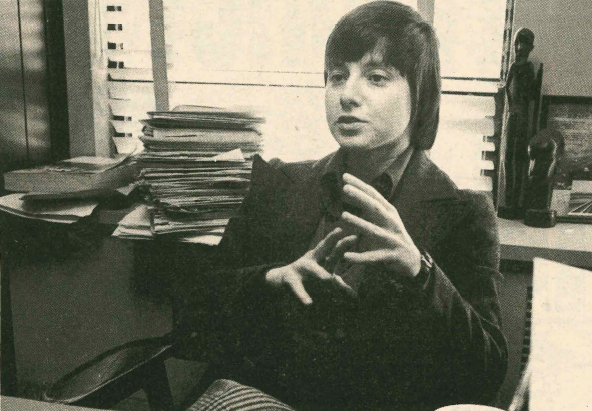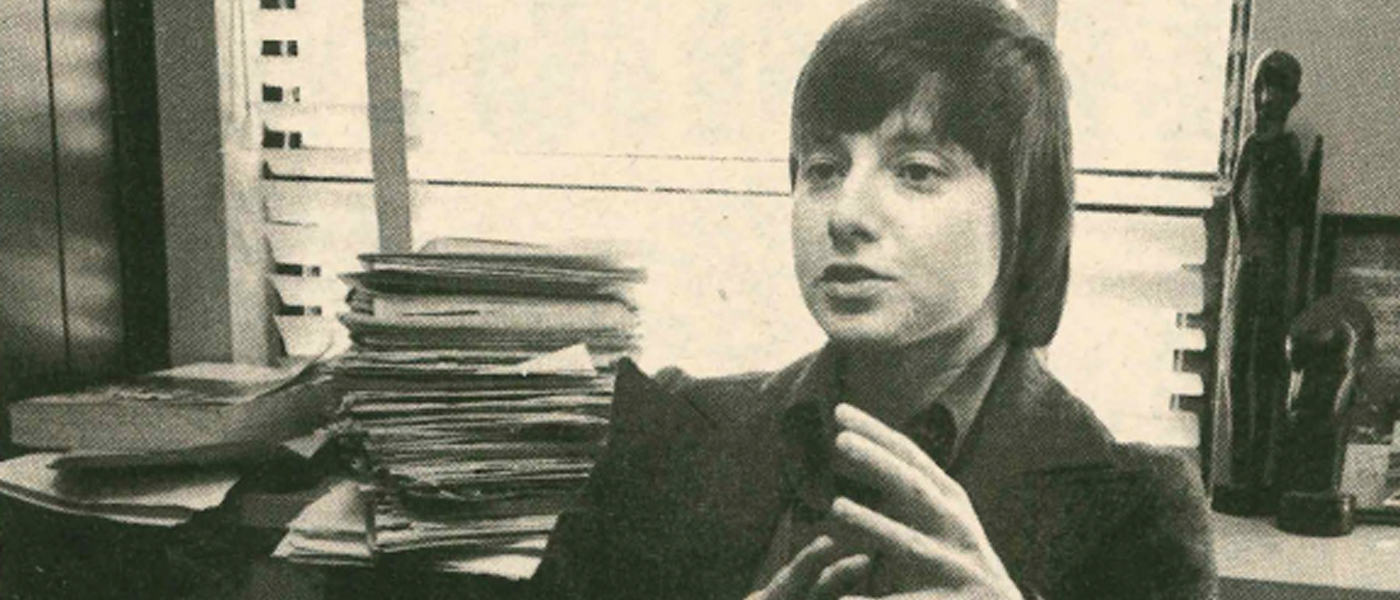(TRANSCRIBED: SYRACUSE NEW TIMES, FEBRUARY 8, 1976)
An 11-year-old girl faces a new home, a new stepmother, a new school and a new family. This displacement is in her best interest, according to State Supreme Court Judge Edward F. McLaughlin of Rome, because the child is currently living with her mother, who is gay.
An order filed by Syracuse attorney Sidney Devorsetz at the county courthouse last week finalized the decision handed down Jan. 2. Attorney for the defense Bonnie Strunk has appealed the decision to the Appellate Division Court of Rochester.
The case is the first of this kind in Syracuse, but lesbian mothers fighting for custody of their children are making news nationally. The trend has been to award custody to fathers, although two suits in Los Angeles and Seattle did result in children being awarded to gay mothers. A currently publicized case occurred in Dallas, Texas, where Mary Jo Risher, a 38-year-old nurse, lost custody of her adopted son. A jury of 10 men and two women decided the boy’s adopted father would provide a better home, four years after the father – Douglas Risher – was involved in a wife-beating episode. Mary Jo Risher must pay $22 in child support.
Although the Risher story was told in People Magazine and on NBC’s Tomorrow show, the Syracuse case will probably not be as well known. A judicial order prevents the mother from engaging the child in any publicity, and the mother is keeping a low profile because she fears losing her job. If the child’s name is made public, the mother could possibly be held in contempt of court, said Strunk. The woman’s sexual preference was not an issue when her ex-husband filed for custody of the daughter in June 1975. In fact, he charged that his ex-wife, known as Anne, was not feeding the girl properly, had struck the child, and that the child, who has a high IQ, was doing poorly in school. The couple has been divorced since 1961, at which time it was agreed that Anne would take the child, according to information released by the Gay Citizens Alliance.
 But included with the other allegations was the implication that Anne was homosexual. This was glossed over originally, said Strunk, and a decision in the case was imminent. When Anne later admitted to her mother that she was homosexual, her shocked mother telephoned Judge McLaughlin, who hauled the case back into court. It was at this point that Strunk, a gay rights advocate, was retained as the woman’s lawyer. “I saw this as part of a bigger issue – the oppression of gays in Syracuse,” she said. “People have a lot of myths about homosexuals.”
She recalled, for example, how the judge tried to figure out “who was the male and who was the female in the lesbian relationship. He kept asking who took out the garbage or did the chores. Finally, he asked how they made love and I would not let my client answer. The judge sat and stared. He wanted to know so badly. I think he decided that because Anne had the child, she was the more feminine.”
McLaughlin, who did confer privately with the child, saw the situation “as an either/or circumstance,” Strunk said. “It was either the lover or the daughter, but the woman couldn’t have both. In other words, she had the right to live with another woman, but not the right to do that plus keep her child.” Although all connected with the case agree the decision should be based on what is best for the child, opinions as to what is best differ.
Dr. John Howland, adolescent psychiatrist and admissions director for Youth Services at Hutchings Psychiatric Center testified on behalf of Anne. “Although the issue here is much more complex,” he said. “in this case it’s a question of the lesser of two evils. “I believe it will be worse for this child to move out of one home and into another than to live with her mother and mother’s roommate, both of whom happen to be gay. “Moving into a new home can be profoundly disturbing to a child. How wiII she explain it? She doesn’t know the real issue. She has not been told her mother is a lesbian. She therefore has to figure out a reason. She will probably feel rejected – that her mother doesn’t want her anymore, and this could confuse her. Her sense of self worth would possibly he diminished.”
Howland pointed out, though, that no matter who the girl lives with, there will come a time when she will face the truth . “She will no doubt have a hard time assimilating it,” he said, “and it could cause some embarrassment. But this could occur no matter who she lives with. It is regrettable she might learn to put her mother down for it.
“This child is already troubled, no doubt, by a divorce and custody proceedings. Although she may initially have difficulty understanding her mother’ s sexuality, losing her mother – which is how she must perceive it – is a far worse situation.”
Dr. Leonard Goldfarb, child psychiatrist with the Psychiatric Association of Centrai .New York, disagrees. “The girl could have so many problems,” he believes. ”and moving her will present her with one less possible problem.” Most children emulate parents, he said. “Girls are usually close to their mothers. There is a possibility of her following her mother’s example. If she chooses not to, this could cause a conflict, and she may have difficulty resolving it.”
Goldfarb, who testified on behalf of the plaintiff, stressed he was not making value judgments about homosexuality. “There’s not anything wrong with becoming a homosexual,” he said, “as long as you opt for it. This girl should grow up making her own decisions. She should have a freedom of choice.” When asked if the father’s home was biased toward a heterosexual preference, he replied, “This is the accepted situation. All you can do is put the person in as an acceptable situation as possible. I never said the father was necessarily the better parent. The fact of the matter is, the child should see the other side of the coin. At age 11, he explained, “a lot of identity is already formed. Lesbian mothers don’t produce lesbian offspring as a rule. There has been a lot of research into what makes a person gay, and this isn’t it. Parents’ preferences are not the kind of thing that determines sexual identity. Your relationship with your parents – the rapport, love and understanding between parent and child – has more to do with it.”
“Most parents don’t even teach children about sexuality until the child’s sexuality is established,” he added. “I have not seen a situation where homosexual parents introduced sexual partners to children. Sexual perversion is not uncommon in very sick families. This is not a sick family.”
The possibility that the child might grow up to be lesbian “seemed to be a great concern to the judge,” said Strunk, who observed also that “mother and daughter are greatly upset by these proceedings.”
In addition to the emotional strain, Anne, who is employed, is finding it difficult to cover court costs. Costs have already exceeded $600 – and an additional $2,000 is needed to finance the appeal.
The Gay Citizens’ Alliance, which is accepting contributions at Box 57, Elmwood Station, Syracuse, 13207, has collected about $650 in donations.
But while money is trickling in, time is running out for Anne and her daughter. The child will probably stay where she is
until the appeal trial is concluded, said Strunk, but the chance that the girl will be uprooted is a constant threat.
Should the child go with her father, she could only visit Anne when no known homosexuals are present, and she could not remain overnight when her mother’s lover is present. This would obviously present Anne with a difficult choice she feels she does not have to make. Ultimately, the only way Anne will be permitted to see her daughter is by concealing what has become a vital part of her life.
by Wendy Shrager
SYRACUSE NEW TIMES, FEBRUARY 8, 1976
But included with the other allegations was the implication that Anne was homosexual. This was glossed over originally, said Strunk, and a decision in the case was imminent. When Anne later admitted to her mother that she was homosexual, her shocked mother telephoned Judge McLaughlin, who hauled the case back into court. It was at this point that Strunk, a gay rights advocate, was retained as the woman’s lawyer. “I saw this as part of a bigger issue – the oppression of gays in Syracuse,” she said. “People have a lot of myths about homosexuals.”
She recalled, for example, how the judge tried to figure out “who was the male and who was the female in the lesbian relationship. He kept asking who took out the garbage or did the chores. Finally, he asked how they made love and I would not let my client answer. The judge sat and stared. He wanted to know so badly. I think he decided that because Anne had the child, she was the more feminine.”
McLaughlin, who did confer privately with the child, saw the situation “as an either/or circumstance,” Strunk said. “It was either the lover or the daughter, but the woman couldn’t have both. In other words, she had the right to live with another woman, but not the right to do that plus keep her child.” Although all connected with the case agree the decision should be based on what is best for the child, opinions as to what is best differ.
Dr. John Howland, adolescent psychiatrist and admissions director for Youth Services at Hutchings Psychiatric Center testified on behalf of Anne. “Although the issue here is much more complex,” he said. “in this case it’s a question of the lesser of two evils. “I believe it will be worse for this child to move out of one home and into another than to live with her mother and mother’s roommate, both of whom happen to be gay. “Moving into a new home can be profoundly disturbing to a child. How wiII she explain it? She doesn’t know the real issue. She has not been told her mother is a lesbian. She therefore has to figure out a reason. She will probably feel rejected – that her mother doesn’t want her anymore, and this could confuse her. Her sense of self worth would possibly he diminished.”
Howland pointed out, though, that no matter who the girl lives with, there will come a time when she will face the truth . “She will no doubt have a hard time assimilating it,” he said, “and it could cause some embarrassment. But this could occur no matter who she lives with. It is regrettable she might learn to put her mother down for it.
“This child is already troubled, no doubt, by a divorce and custody proceedings. Although she may initially have difficulty understanding her mother’ s sexuality, losing her mother – which is how she must perceive it – is a far worse situation.”
Dr. Leonard Goldfarb, child psychiatrist with the Psychiatric Association of Centrai .New York, disagrees. “The girl could have so many problems,” he believes. ”and moving her will present her with one less possible problem.” Most children emulate parents, he said. “Girls are usually close to their mothers. There is a possibility of her following her mother’s example. If she chooses not to, this could cause a conflict, and she may have difficulty resolving it.”
Goldfarb, who testified on behalf of the plaintiff, stressed he was not making value judgments about homosexuality. “There’s not anything wrong with becoming a homosexual,” he said, “as long as you opt for it. This girl should grow up making her own decisions. She should have a freedom of choice.” When asked if the father’s home was biased toward a heterosexual preference, he replied, “This is the accepted situation. All you can do is put the person in as an acceptable situation as possible. I never said the father was necessarily the better parent. The fact of the matter is, the child should see the other side of the coin. At age 11, he explained, “a lot of identity is already formed. Lesbian mothers don’t produce lesbian offspring as a rule. There has been a lot of research into what makes a person gay, and this isn’t it. Parents’ preferences are not the kind of thing that determines sexual identity. Your relationship with your parents – the rapport, love and understanding between parent and child – has more to do with it.”
“Most parents don’t even teach children about sexuality until the child’s sexuality is established,” he added. “I have not seen a situation where homosexual parents introduced sexual partners to children. Sexual perversion is not uncommon in very sick families. This is not a sick family.”
The possibility that the child might grow up to be lesbian “seemed to be a great concern to the judge,” said Strunk, who observed also that “mother and daughter are greatly upset by these proceedings.”
In addition to the emotional strain, Anne, who is employed, is finding it difficult to cover court costs. Costs have already exceeded $600 – and an additional $2,000 is needed to finance the appeal.
The Gay Citizens’ Alliance, which is accepting contributions at Box 57, Elmwood Station, Syracuse, 13207, has collected about $650 in donations.
But while money is trickling in, time is running out for Anne and her daughter. The child will probably stay where she is
until the appeal trial is concluded, said Strunk, but the chance that the girl will be uprooted is a constant threat.
Should the child go with her father, she could only visit Anne when no known homosexuals are present, and she could not remain overnight when her mother’s lover is present. This would obviously present Anne with a difficult choice she feels she does not have to make. Ultimately, the only way Anne will be permitted to see her daughter is by concealing what has become a vital part of her life.
by Wendy Shrager
SYRACUSE NEW TIMES, FEBRUARY 8, 1976


Syracuse Attorney Bonnie Strunk, who is representing a lesbian mother in her attempt to retain custody of her child: ‘I saw this as part of a bigger issue. People have a lot of myths about homosexuals.’ (Photo by Barone)











